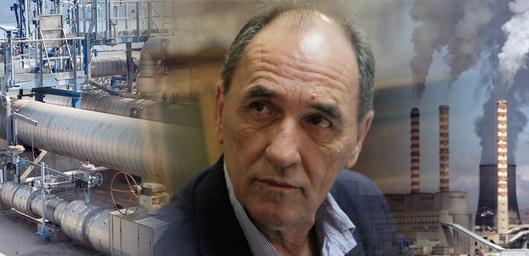The country’s new Environment and Energy Minister Giorgos Stathakis, just appointed as part of a government reshuffle, faces for key isssues – the ailing main power utility PPC; the bailout-related plan entailing the privatization of a 17 percent stake; the long-running and troubled sale of a 66 percent share of DESFA; and the position to be adopted in the natural gas market’s ongoing liberalization.
PPC’s future course amid Greece’s changing electricity market is the most challenging matter of all. The utility, whose market share and profit figures are weakening as a result of a bailout-required contraction that demands a further 40 percent market share fall by 2020, from around 89 percent at present, faces growing debt and bad debt figures.
Households, businesses, industrial enterprises and the Greek State owe the utility an alarming total of roughly 3 billion euros in overdue electricity bills. PPC, itself, owes contractors around 900 million euros, much of this overdue. The new energy minister will need to add his personal touch to all these developments.
Despite the reshuffle, it remains unknown if the government will, in 2017 and 2018, succeed in carrying out the expected energy-sector privatizations, key aspects of the bailout program from here onwards.
Prime Minister Alexis Tsipras and associates will need to strike a balance that will keep satisfied both the country’s lenders and Syriza party members opposed to energy-sector privatizations.
Further decisions on PPC’s 17 percent will be made once the split and sale of a chunk of subsidiary IPTO, the power grid operator, has been completed. The minister will need to be done here by early 2017.
Besides the electricity market, major developments in the natural gas market also need to be managed by the minister.
The delayed sale of a 66 percent of DESFA, the natural gas grid operator, has been given an additional month, until the end of November, following the renewal of a letter of guarantee by prospective buyer Socar. The Azerbaijani energy company, as well as Italy’s Snam, expected to take on part of Socar’s share, stand far apart from the Greek government on the deal’s price tag. The possible buyers contend that the original price of 400 million should be reduced to around 300 millin euros as a result of revenue-limiting measures imposed on DESFA by the previous energy minister, Panos Skourletis, now in charge of the Ministry of Interior Affairs.
The liberalization of Greece’s natural gas market is progressing rapidly. Stathakis, the new energy minister, will need to keep a close watch on the developments.
The local market is following a European trend through which intergrated electricity companies are also selling natural gas. As of 2017, non-household consumers will be free to choose supplier, regarless of quantity consumed. Households will also be able to do so as of January, 2018.
Russia’s Gazprom recently bypassed its traditional Greek market representative, DEPA (Public Gas Corporation), by selling an amount to Promitheas Gas, a 50-50 joint venture established by Gazporm with the Copelouzos group.





